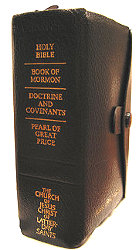Is Mormonism a "Cult"?

A media “firestorm” (mostly a “manufactured” controversy, I have little doubt) arose recently when Robert Jeffress, pastor of historic First Baptist Church of Dallas, Texas, and a strong supporter of Texas Governor and presidential candidate Rick Perry, declared that Mormonism, the religion of rival candidate Mitt Romney, was a cult. Some in and out of the media expressed concern, disdain, even outrage at this insensitive, even, some said, bigoted remark. Regardless of the response to Pastor Jeffress’ words, the real question is—did he speak the truth? Is Mormonism in fact a non-Christian cult?
The first issue in settling such a question is the matter of definitions. What is a “cult”? I have seen various definitions, but have settled on my own, which is more of a characterization than strictly a definition.
What is a cult?
First, cults claim to be “real” or “restored” Christianity, which had somehow been “lost” somewhere between the first century and the time of the founding of the cult.
Second, cults are almost uniformly non-Trinitarian (most are Unitarian, but some are polytheistic).
Third, cults teach de facto or de jure the inadequacy and incompleteness of the revelation in Scripture, and hence the need for two things:
- a new inspired prophet or prophets (usually beginning with if not limited to the founder of the cult);
- further divine revelations, which are communicated through that prophet.
Fourth, cults, as with all false religions, teach salvation by means of human religious works.
Fifth, there is no salvation outside the cult.
Measuring Mormonism
I have studied the various major cults over four decades of ministry and have taught general survey courses on the subject more than once. I have also written extensively about some of them. I acknowledge that my special expertise in this area is in Seventh-day Adventism, the Jehovah’s Witnesses and the Moonies (Unification Church) and not in Mormonism. But I have sufficient knowledge to say beyond any doubt that Mormonism has all the ear-marks of a cult noted above.
First, Joseph Smith’s (1805-1844) “testimony” includes alleged divine instructions not to join any church but to start his own and restore lost Christianity.
Second, while Mormons talk about “the Father, Son and Holy Spirit,” and will claim that they believe in the same God as evangelical Christians, they are either ignorant or disingenuous in this claim. Mormonism is polytheistic, teaching that there are many gods, and that you yourself can become a god with your own universe to tinker with (compare Satan’s promise in Genesis 3:5). In fact, Mormonism teaches that God was once a man but attained divine status. They also teach that somehow Adam is God—who then made him and to whom did he talk in Eden? Mormonism also teaches that Christ and Satan are brothers and that Jesus was conceived by actual physical sexual relations between God and Mary—blasphemy, to say the least.
Third, Mormons are outspoken about the need—and provision—of new, inspired Scriptures. These include The Book of Mormon, allegedly translated by Joseph Smith using magic glasses, from a “reformed Egyptian” text written on golden plates (the plates being discovered after Smith allegedly received angelic communication as to their whereabouts). The true origin of The Book of Mormon is likely much more mundane. It is credibly affirmed that it was a novel written by a Rev. Spalding, which Smith (or someone else) found in manuscript in a printer’s office and claimed as his own. (For a telling exposé of this widespread genre of fictional religious literature, in which The Book of Mormon fits perfectly, see Modern Apocrypha: Modern “Biblical” Hoaxes by Edgar J. Goodspeed. Beacon Press, 1931, 1956). Strangely, the book teaches no distinctive Mormon doctrine, makes no claim of being a divine revelation, and has some howlers among its legion of factual errors (including the claim that Jesus was born in Jerusalem).
The real leading light of Mormonism, the man who shaped it into full-fledged cult status, was Brigham Young (1801-1871), husband of twenty-seven wives and father of more than fifty children. The works that actually shaped Mormon doctrine were the other two “inspired” Mormon books—Doctrines and Covenants, and Pearl of Great Price. These three new “Scriptures” are often bound together with the Bible.
Fourth, salvation by works is a hallmark of Mormonism—going on “mission,” doing “temple work” (including proxy baptism to save the dead), a secretive temple marriage ritual, and much more.
Fifth, Mormonism claims that while non-Mormons may have a place in eternity, only faithful Mormons will attain to the highest heavenly status, becoming gods with their own personal universe to control.
Mormonism, then, does have every characteristic of a cult, and in nothing does it conform to historic, biblical Christianity. It is indeed, as Pastor Jeffress stated, a non-Christian cult.
Douglas K. Kutilek Bio
Doug Kutilek is the editor of www.kjvonly.org, which opposes KJVOism. He has been researching and writing in the area of Bible texts and versions for more than 35 years. He has a BA in Bible from Baptist Bible College (Springfield, MO), an MA in Hebrew Bible from Hebrew Union College and a ThM in Bible exposition from Central Baptist Theological Seminary (Plymouth, MN). His writings have appeared in numerous publications.
- 30 views
I’ll probably have to withdraw my question later.
[Joshua Hawn] Not to be argumentative, but how is claiming that we need new Scriptures because we lost the originals (Mormons, et al) different than claiming that we need new manuscripts because the originals were tainted?The first one is Mormonism, Islam, et al.
I’ll probably have to withdraw my question later.
The other is King James Onlyism—cos not till 1611 (or 1769 or 1900, depending) did these new “manuscripts” (called version, edition, etc.) appear. Before any of those dates, not a single manuscript reflected the text of the KJB exactly.
Hope that helps.





Discussion